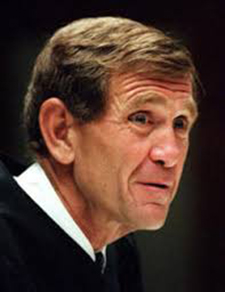Wave Wire Services
LOS ANGELES — Mayor Karen Bass is offering to have Los Angeles pay for an independent audit of the city’s homelessness programs in answer to a federal judge’s questions about the program’s transparency and effectiveness.
Bass and City Council President Paul Krekorian spoke to U.S. District Judge David Carter by telephone March 8, agreeing that the court could have final say in choosing an auditor, the judge said during the brief resumption of a hearing dealing with a motion brought by the L.A. Alliance for Human Rights asking for penalties to be brought against the city.
Carter has not agreed to the final parameters of the proposed audit.
Bass and Krekorian will appear in a federal courtroom in downtown Los Angeles March 18 to work out the details.
L.A. City Controller Kenneth Mejia has also expressed concerns about the city’s homelessness programs, telling Carter about what he called the city’s “lack of transparency and accountability on homelessness efforts despite billions of dollars spent.”
Mejia said that he is launching a “focused audit” on Bass’ signature Inside Safe initiative, but City Administrative Officer Matt Szabo disputed that Mejia has the authority to audit the mayor’s homelessness programs in court, the Los Angeles Times reported.
“Our office welcomes an external, independent auditor to aid in that ongoing litigation,” Mejia told The Times. “However, the issues at play in the federal litigation are specific and unique to that case. As the city’s chief auditor, it is my responsibility to bring transparency and accountability to specific components of Inside Safe.”
In March 2020, the L.A. Alliance, a coalition of downtown business owners and residents, sued the city and county of Los Angeles to compel elected officials to rapidly address the homelessness crisis, especially in light of the COVID-19 pandemic. The group is demanding that the city pay a nearly $6.4 million fine for its alleged lack of transparency and failure to reduce homeless encampments within deadlines set in the April 2022 settlement of the city’s part of the lawsuit.
In the 2020 lawsuit, the plaintiffs demanded the immediate creation of shelter and housing to get people off the streets, services and treatment to keep the unhoused in shelter, and regulation of public spaces to make streets, sidewalks and parks safe and clean.
In the eventual settlement, it was agreed that the city would reduce encampments, add more shelter beds, establish deadlines and goals to document its progress, and return public spaces to their intended uses.
The county’s settlement agreement would create 3,000 treatment beds for unsheltered people with mental illnesses and addictions, subsidize 450 “board and care” beds, and establish deadlines and targets to document its efforts.
According to the L.A. Alliance, the settlements will result in 3,500 mental health and treatment beds and 19,700 beds for people experiencing homelessness, including 6,700 beds focused on helping those living near freeways and underpasses.
Although the lawsuit originally appeared to target the Skid Row area specifically, the city and county’s agreements cover all of Los Angeles and are not limited to Skid Row and downtown. The current L.A. Alliance motion singles out downtown’s Skid Row area and two locations in Highland Park as requiring urgent action.
Carter approved the settlements on the condition that he closely oversee the city and county’s progress in meeting their deadlines and goals.
The judge has not ruled on the L.A. Alliance motion recommending that the city pay the multimillion-dollar fine, but he said he is “uncomfortable” with the proposed sanction.
He indicated March 7 that the city has acted in “bad faith” in submitting plans for meeting its goals, but at different times during the hearing he complimented Bass and Krekorian for their leadership on the issue.
Carter has demanded what he calls “absolute transparency” in the city’s spending and said he wants all invoices going forward to include a summary of where the money was going. The judge suggested there is too much waste in the millions of dollars put toward the homeless in Los Angeles.
“Our ultimate goal isn’t handing out peanut butter,” he said from the bench. “Our ultimate goal is shelter and housing.”
The motion alleges that the city is not meeting its goals of housing a minimum of 60% of people living on the streets in each of the city’s 15 council districts.
The L.A. Alliance alleges the city did not live up to its agreement to create a total of 5,190 beds by the end of 2023. The association of downtown business and property owners contends the city has created only 2,810 beds — falling 2,380 short.
In his response, Chief Assistant City Attorney Scott Marcus told the court March 7 that while the city faced a “delay” in complying with part of the settlement, it did not blow any deadlines.
“Yes, it took the city longer than it should have,” Marcus said. “We are sorry.”
Within the last 10 months, 26 homeless encampments have been “resolved” and 1,600 people have been brought inside, he said.
“We are not yet in breach of this agreement,” Marcus said. “The city is fully transparent about what it’s doing. And fully transparent about (saying), ‘We’re not there yet.’”
LIFTOUT
“Our ultimate goal isn’t handing out peanut butter. Our ultimate goal is shelter and housing.”
— Federal Judge David Carter









